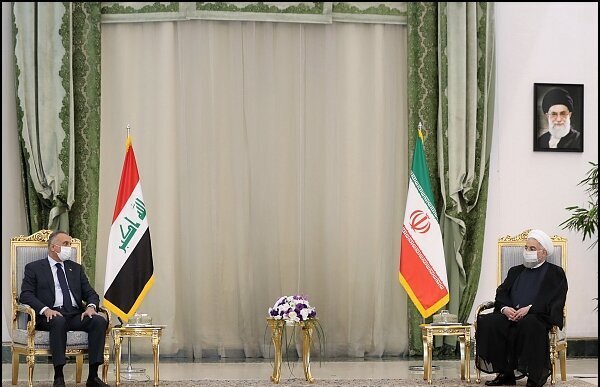The kind of ‘balanced ties’ that Iraqi PM seeks to establish

TEHRAN- Iraqi Prime Minister Mustafa al-Kadhimi paid a visit to Iran on Tuesday and Wednesday, in a bid to establish what some Iraqi officials call ‘balanced ties’ with Iran and other countries like Saudi Arabia and the U.S.
“Iraq wants balanced ties with neighboring countries on the basis of Iraq’s interest and non-interference in internal affairs,” Iraqi Foreign Minister Fuad Hussein said during a joint press conference with his Iranian counterpart Mohammad Javad Zarif, who was on a one-day visit to Baghdad on July 19, two days before the Iraqi prime minister starts a trip to Iran.
Al-Kadhimi echoed the same remarks during his visit to Tehran, saying that Iraq is “eager to have cooperative relations with Iran on the basis of the principle of non-interference in internal affairs.”
The remarks have been widely interpreted by Saudi and American news media outlets as an effort by the prime minister to distance his country from Iran. However, analysts tell the Tehran Times that al-Kadhimi’s push to establish balanced ties with neighboring countries like Iran doesn’t mean that Iraq’s relations with Iran is at risk of being undermined because all Iraqi prime ministers have sought to establish balanced ties with Iran, Saudi Arabia, and the U.S.
“No prime ministers in Iraq can take only one side, and that Iraq can’t rely on only one country. Baghdad is just like Beirut, where there are many competing forces,” Amir Mousavi, who was Iran’s cultural attaché in Algeria in 2015, told the Tehran Times. Mousavi said the Iraqi government needs to establish coordination with Iran, Saudi Arabia, and the U.S. to move forward with its internal security, political and economic plans.
Al-Kadhimi presented a “governmental program” to the Iraqi parliament, after he was named by the Iraqi president to form a government. He said in the program that Iraq’s foreign relations would be based on three pillars: sovereignty, balance and cooperation.
According to the program, which was passed by the parliament, national sovereignty cannot be ensured without relying on the principle of balance in foreign relations and the balance requires Iraq to avoid taking sides in conflicts. The program also stipulates that the government should seek cooperation at the regional and international levels and secure Iraq’s national interests through dialogue and bilateral cooperation.
Al-Kadhimi’s visit to Iran was a major step towards securing Iraq’s national interests, according to Hassan Kazemi Qomi, Iran’s former ambassador to Iraq.
“The Iraqi prime minister’s visit to Iran was important because the U.S. has sought to put pressure on Iraq to sever its economic relations with Iran. Iraq plays a pivotal role in circumventing the U.S. sanctions on Iran. That’s why the Americans seeks to disrupt the cooperation between Iran and Iraq. But al-Kadhimi showed by visiting Iran that what matters most to him is the Iraqi interests, and these interests are dependent on expanding ties with Iran,” the former diplomat told the Tehran Times.
Kazemi Qomi also said that Iran’s strategic policy towards Iraq was to help the Iraqi people at all times and that no county can claim that it has stood by the Iraqi people like Iran.
During his visit to Iran, al-Khadimi touched on this realty. Speaking at a joint press conference with Iranian President Hassan Rouhani, he said: “We fought against terrorism and Takfiri groups, and Iran was the first country to stand by Iraq in this fight. We will not forget this. That’s why Iraq is standing by Iran so that it tackles its economic challenges. Iraq has become a market for Iranian goods.”
But the prime minister also needs to maintain good relations with Saudi Arabia and the U.S., because these countries could disrupt his internal plans, if he chooses to further tilt the balance in Iran’s favor, according to Mousavi, who is now director of the Tehran-based Center for Strategic Studies and International Relations.
“The U.S. and Saudi Arabia have zero tolerance for the expansion of ties between Iran and Iraq. They are very sensitive about the expansion of ties. But Iran has no problem with Iraq expanding ties with the U.S. and Saudi Arabia,” Mousavi told the Tehran Times.
According to Mousavi, the U.S.-Saudi zero-tolerance policy was on full display in the electricity crisis in Iraq.
The country is suffering from shortage of electricity, especially in the summertime, which led it to import electricity from neighboring Iran. In an attempt to strangle Iran’s economy, the U.S. is putting pressure on Iraq to abide by its sanctions on Iran by ending energy imports from Iran.
“They are not helping Iraq on the electricity issue, nor are they allowing Iran to do so,” added Mousavi.
In light of this realty, al-Kadhimi seeks to establish “balanced ties” with countries like Iran, Saudi Arabia, and the U.S. to implement his programs and secure Iraq’s national interests through cooperating with all major regional and international players.
He is expected to visit the U.S. in late July. The Americans are already threatening sanctions on some Iraqi officials in the Popular Mobilization Forces (PMF) for their close relationship with Iran. And the Saudis have already asked al-Kadhimi to postpone his visit to Saudi Arabia. So it’s not clear if the Americans and Saudis support the prime minister’s idea of balancing Iraq’s ties with their countries.
Therefore, the Iraqi prime minister’s push to balance his country’s ties with other countries isn’t aimed at undermining ties with Iran. Instead, it’s aimed at creating a long-term framework for the Tehran-Baghdad ties. Iraq has much in common with Iran. Tehran has clearly voiced its support for al-Kadhimi because Iran itself pursues balanced ties with neighboring countries.
“The Islamic Republic of Iran believes that it should have friendly and balanced relations in the region, especially with the neighboring countries,” IRNA quoted Abbas Mousavi, the spokesman for Iran’s Foreign Ministry, as saying on July 17.
SKM/PA
Leave a Comment